Sally Whitney, project team member, talks powerfully about accessible churches and how COVID has opened up new opportunities for access. You can watch the short film here.
Rethinking Our Lives.
This post offers information about a new small project from the Living Life to the Fullest Team called Rethinking Our Lives, a research project from the University of Sheffield in partnership with Scope
What is the project’s purpose?
Rethinking Our Lives aims to learn about the lives of disabled young people. To do this, we want to hear young people’s voices, their opinions and views. Our explorations will build into a ‘capital model’ that will be used by Scope, a national charity supporting equality for disabled people, in its planning and services for disabled young people in the future. A capital model focuses on young people’s capacities and strengths. We hope that this model will ultimately change the way society views and acts towards disabled young people and support them to succeed.
In partnership with Scope, we will use a co-production model that centres disabled young people as researchers. This means that two disabled young people – Sally Whitney and Lucy Watts MBE – are core members of the research team.
How can I take part?
If you are a disabled young person who wants to speak about their lives and experiences
of disability for Rethinking Our Lives, you can participate in the following ways:
One: Join our Tweet-Chat!
We will be hosting a Tweet-Chat on Tuesday 30th June 2020, from 7.00 – 8.00pm.
Come and join us on the above date at our #DisabilityYouth2020 hashtag or check out @FullLivesESRC
We will tweet a series of questions, to which you can reply with your thoughts. Please note that all of your responses will be public.
If you have any further questions, please email Kirsty on k.liddiard@sheffield.ac.uk
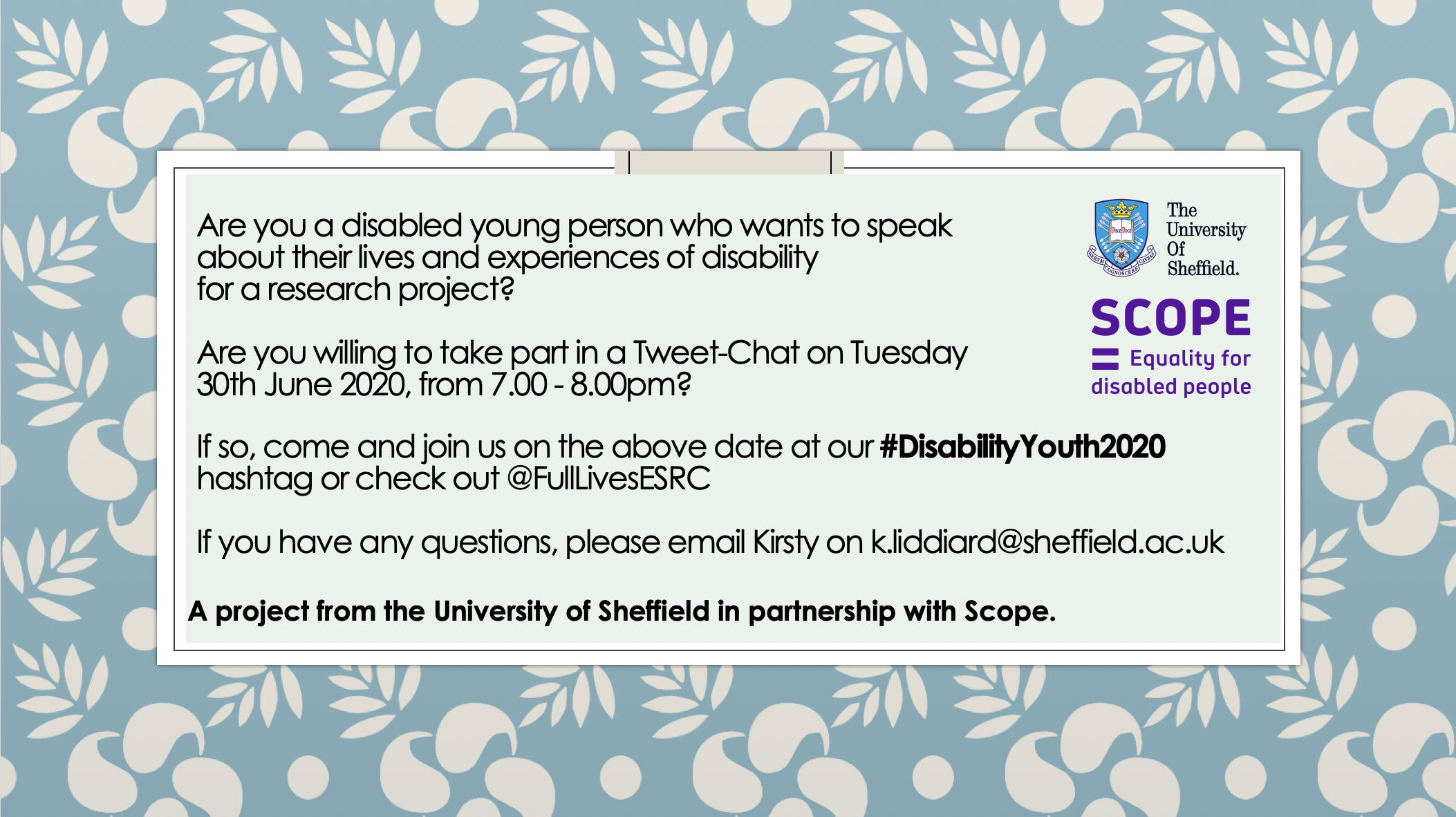
Two: Participate in a Facebook Focus Group
In you are a disabled young person aged 14+ and are willing to take part in an online Facebook focus group, commenting when you have time, with other disabled young people, we would love to hear from you!
To participate, we will need you (and your parent/carer if you’re under 18) to sign a consent form. We will also send you an information sheet, to learn more.
If you are interested, or have any questions, please contact Kirsty on k.Liddiard@sheffield.ac.uk or see our ‘Rethinking Our Lives’ page on Facebook.
We expect the Facebook focus group to take place from Monday 6th July to Friday 10th July 2020. If you participate, you will be expected to post/engage in the discussion at this time.
For participating in the Facebook focus group, we will give you a £20 e-voucher to say thank you.
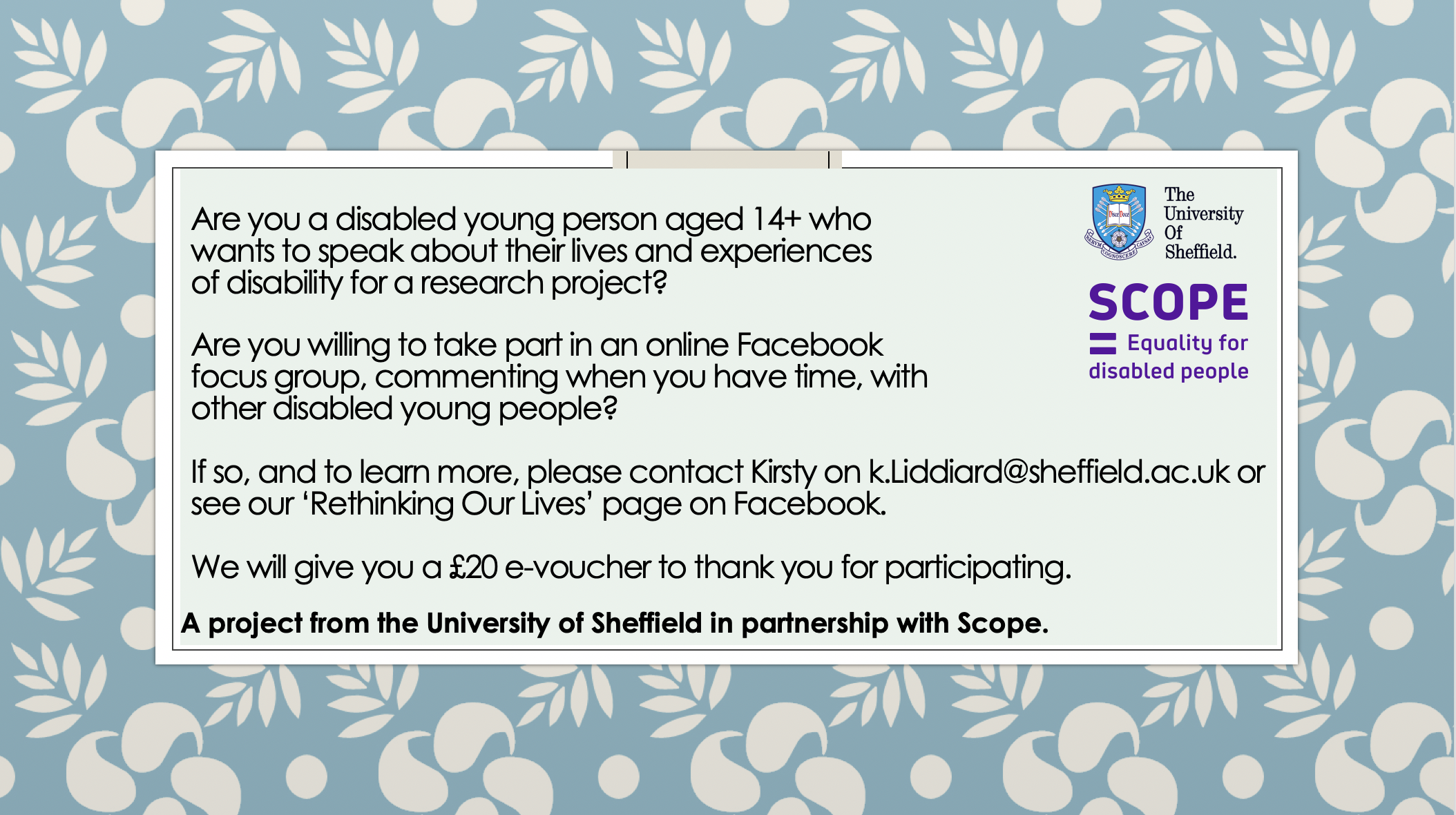
The power of peer-to-peer support during a pandemic
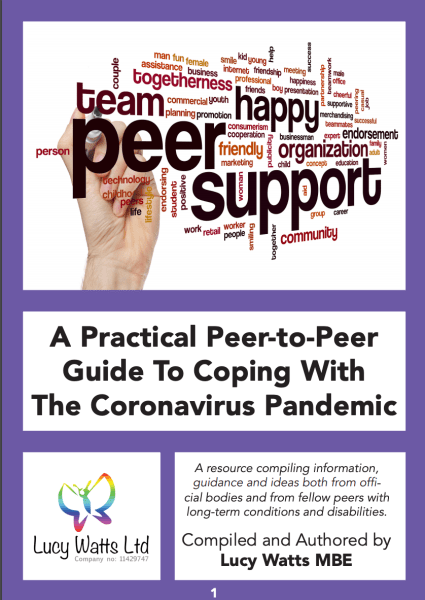 Our Lead Co-Researcher Lucy Watts MBE has put together a fantastic peer-to-peer resource for disabled people on ways to cope with the current COVID 19 pandemic. A Practical Peer-to-Peer Guide To Coping With The Coronavirus Pandemic is available and free to access here.
Our Lead Co-Researcher Lucy Watts MBE has put together a fantastic peer-to-peer resource for disabled people on ways to cope with the current COVID 19 pandemic. A Practical Peer-to-Peer Guide To Coping With The Coronavirus Pandemic is available and free to access here.
The Guide compiles the information people need into one resource, around shielding, infection prevention and control, managing care needs and care packages during the pandemic, contingency planning and advance care planning.
Lucy says that it is by no means an official peer reviewed document, nor is it to be read like a manual, and advises that people do their own research too, and if you need to, talk with your medical team and/or CCG or Local Authority before making any decisions.
It supports disabled and chronically ill people, their families and carers to have information and ideas for what they can do and how they can manage during the pandemic.
Disabled people and the #CoronavirusBill
We must not allow a #CoronaVirusBill that will suspend the protections offered by the #CareAct2014. Write to your MP NOW : https://www.writetothem.com/write and use the text provided here:
Dear [add your MP’s name]
I believe that the #CoronaVirusBill presents a real and present danger to the lives of disabled people. The government’s plans for disabled children and adults during the crisis are effectively rolling back 30 years of progress for disabled people. The government’s plans are to:
- remove disabled people’s rights to social care
- change the duties to meet children’s educational requirements to a ‘reasonable endeavours’ duty
- attack the civil liberties of disabled people and erode their rights to support
I am asking the government to work closely with disabled people’s organisations and families of disabled people to protect their human rights in a time of crisis.
I implore you to fight for the hard fought rights of disabled children, young people and adults and their families and to amend the schedules in the Bill that remove social care and SEND duties and threaten the civil liberties of disabled people.
To explain my reasons for writing to you, please see my understanding of negative social implications of the #CoronaVirusBill on the lives of disabled people and their families:
Yours sincerely
[Name]
What does it mean for disabled adults?
The Bill suspends every duty in the Care Act, 2014, including the duty to meet the eligible needs of disabled people (Section 18) and their carers (Section 20). Under the #CoronaVirus Bill, Local Authorities will only have to provide care ‘if they consider it necessary’ for the purposes of avoiding a breach of the European Convention of Human Rights (ECHR). There is no human right to social care or positive obligation under the ECHR to meet care needs.
Other changes set to be introduced through the #CoronaVirusBill will allow health bodies to delay carrying out an assessment for eligibility for NHS continuing care
What does it mean for disabled children and young people?
Duties for young people transitioning to adult social care have also been suspended.
The Secretary of State for Education will have power to disapply the duty on schools and other institutions to admit a child to a school where they are named on an EHCP. The Secretary of State will be able to vary provisions of the act, such as the core duty to procure provision set out in an EHCP, so instead of being an absolute duty it becomes a ‘reasonable endeavours’ duty, creating a lesser entitlement for up to two years.
What about the Mental Health Act?
The power to recommend individuals be detained under the Mental Health Act will be implemented using one doctor’s opinion instead of two, making it easier for people to be detained.
The proposed bill will temporarily allow the extension or removal of time limits in mental health legislation which means individuals might be released into the community early, or find themselves detained for longer.
Under section 5, emergency detention for people already in hospital would extend from 72 hours to 120 hours, and nurses’ holding powers would extend from 6 to 12 hours. Under sections 135 and 136, police powers to detain a person found in need of immediate care at a “place of safety” will extend from 24 hours to 36 hours. Under section 35/36, the cap on how long someone can be held in hospital while awaiting a report (currently 12 weeks) will be lifted.
What about the rights of disabled people?
Local authorities will have a duty to uphold disabled people’s human rights under the European Convention on Human Rights, BUT the threshold for a breach, in terms of not providing care and support is high, which means that disabled people will be left without care and support. Lack of care and support will have a significant impact on disabled people’s well-being, but may not be considered to reach the threshold for their human rights to have been breached – they will NOT have a right to care and support.
Sources of information
Watch @stevebroach, Public Law Barrister talk about the impact of the Bill here: https://www.specialneedsjungle.com/steve-broach-public-law-barrister-on-the-coronavirus-bills-implications-for-disabled-children/
Read this Twitter thread for more information: https://twitter.com/JamieBurton29/status/1240781535340568577
Statement from National User Survivor Network: https://www.nsun.org.uk/News/covid-19-and-human-rights
Current hashtags: #CoronaVirusBill #CoronavirusBillUK
“It’s almost like he’s an extension of me”: The Canine Care Project
Today we are really excited to be launching The Canine Care Project Report! Our report details our research into disabled young people’s experiences with their assistance dogs, which found that:
- Assistance dogs improve feelings of loneliness, anxiety, isolation and fear for disabled young people.
- 86% of disabled young people surveyed say their assistance dog makes them feel more optimistic.
- Assistance dogs helped the majority of those surveyed to embrace their disability.
Where can I learn more?
- You can access The Canine Care Project report here.
- We have also made an accompanying animated short film too, which you can watch online here on YouTube.
What is the Canine Care Project?
The Canine Care Project is a small research project that explored the experiences of disabled young people who have assistance dogs. We partnered with Canine Partners, a registered charity that transforms the lives of disabled people through partnering them with assistance dogs. Through a small collective Research Team of academic researchers, Canine Partners collaborators, and Sally Whitney, a disabled young co-researcher who has a Canine Partner, we wanted to further explore related early findings emerging from our larger umbrella project, Living Life to the Fullest.
What is an assistance dog? An assistance dog is an animal that supports a disabled person with tasks in everyday living. Canine partners’ assistance dogs are trained to help with everyday tasks such as opening and closing doors, unloading the washing machine, picking up dropped items, pressing buttons and switches and fetching help in an emergency. They can even help people to get undressed and remove a card from an ATM. Canine partners’ assistance dogs also provide many psychological and social benefits such as increased independence, confidence, motivation and self-esteem; companionship, security and unconditional love; a talking point, increasing social interaction; helping to return to work, voluntary positions or further education and reducing reliance on human carers and, in some cases, medication.
What did we find?
- Using surveys and interviews with disabled young people aged between 18 and 35 who are partnered with an assistance dog, we found 86 per cent felt more optimistic thanks to their dog.
- Over 90 per cent of disabled young people surveyed reported feeling less lonely, 88 per cent felt less anxiety and 86 per cent felt less isolated. Assistance dogs were said to boost confidence for 90 per cent of participants, and help them to navigate social situations.
- Assistance dogs were said to put non-disabled people more at ease in social situations, and help 67 per cent of the young people to embrace their disability.
- Nine out of 10 of those surveyed said their dog had boosted their confidence, with some saying they had helped them to achieve major goals such as getting a degree and living independently.
- Over two thirds of disabled young people said that, since getting their assistance dog, they relied less on support from human carers – with 81 per cent saying they had reduced the discomfort and guilt they feel when relying on human carers. More than half also felt that their assistance dog had helped them take better care of their physical health.
Kirsty Liddiard, Living Life to the Fullest Researcher and Senior Research Fellow at the University of Sheffield, said: “Our research makes clear the transformative impact an assistance dog can have on a disabled young person’s life – increasing independence, building confidence and helping young people to embrace who they are.
“In the future, we would like to see policymakers, local authorities and care professionals making all disabled young people aware of the possibilities and benefits of canine care.”
Sally Whitney, a disabled young co-researcher on the project, said: “Leading the project has been an honour and a joy as it is a topic that is incredibly important to me. It was because of my own experiences of being a disabled young person and having my assistance dog, Ethan, that meant I was so keen to work on the project. This has given me the impetus to probe further into the experiences of other young people and the results have shown an even deeper level of impact than I had anticipated. It is clear that assistance dogs do so much more than physical tasks and have a transformational impact on how young people receive care and, in turn, on so many aspects of their lives.”
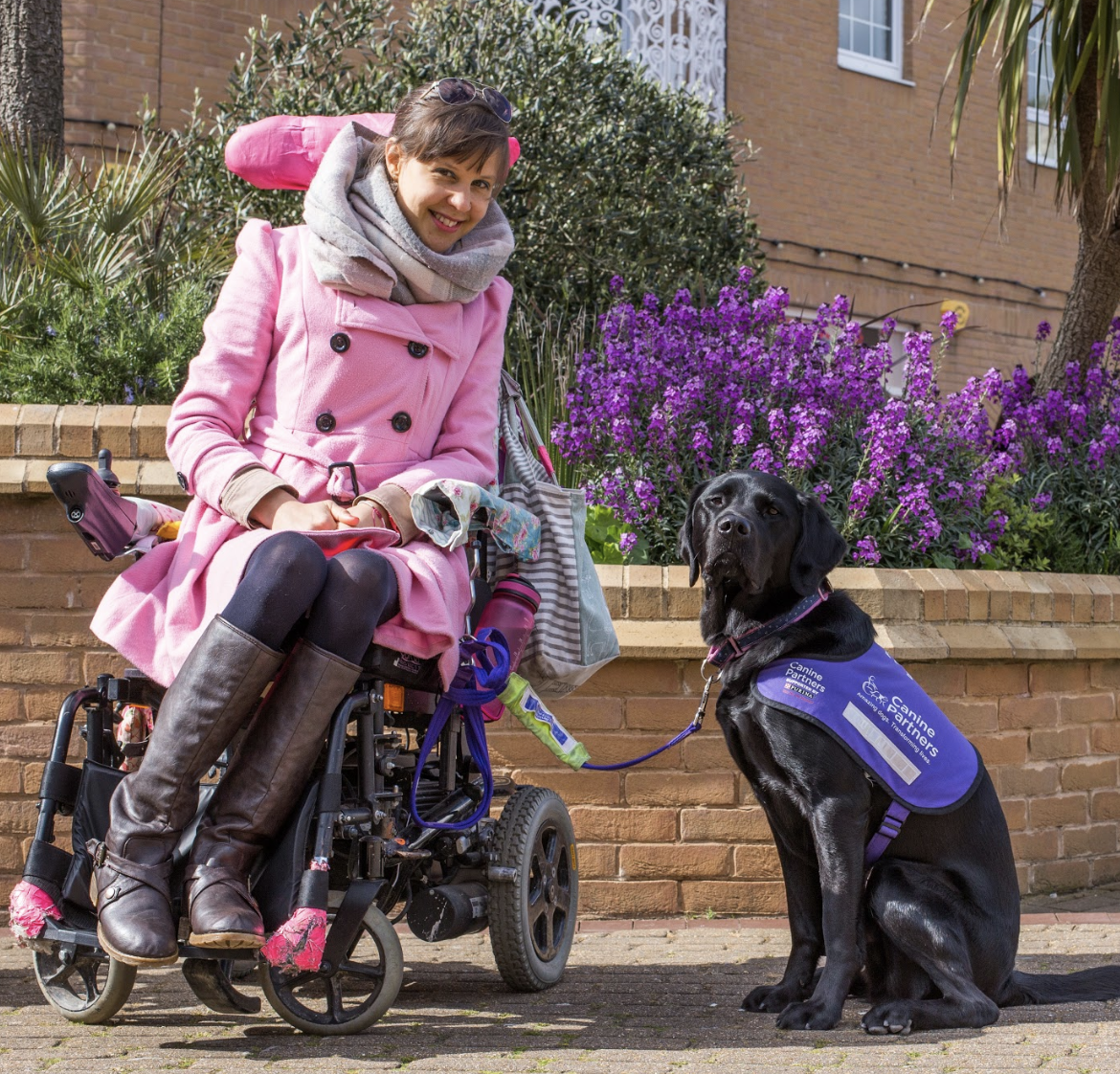
Sally and her Canine Partner, Ethan
Living Full Lives 2020 – A note on the upcoming #UCU strike action
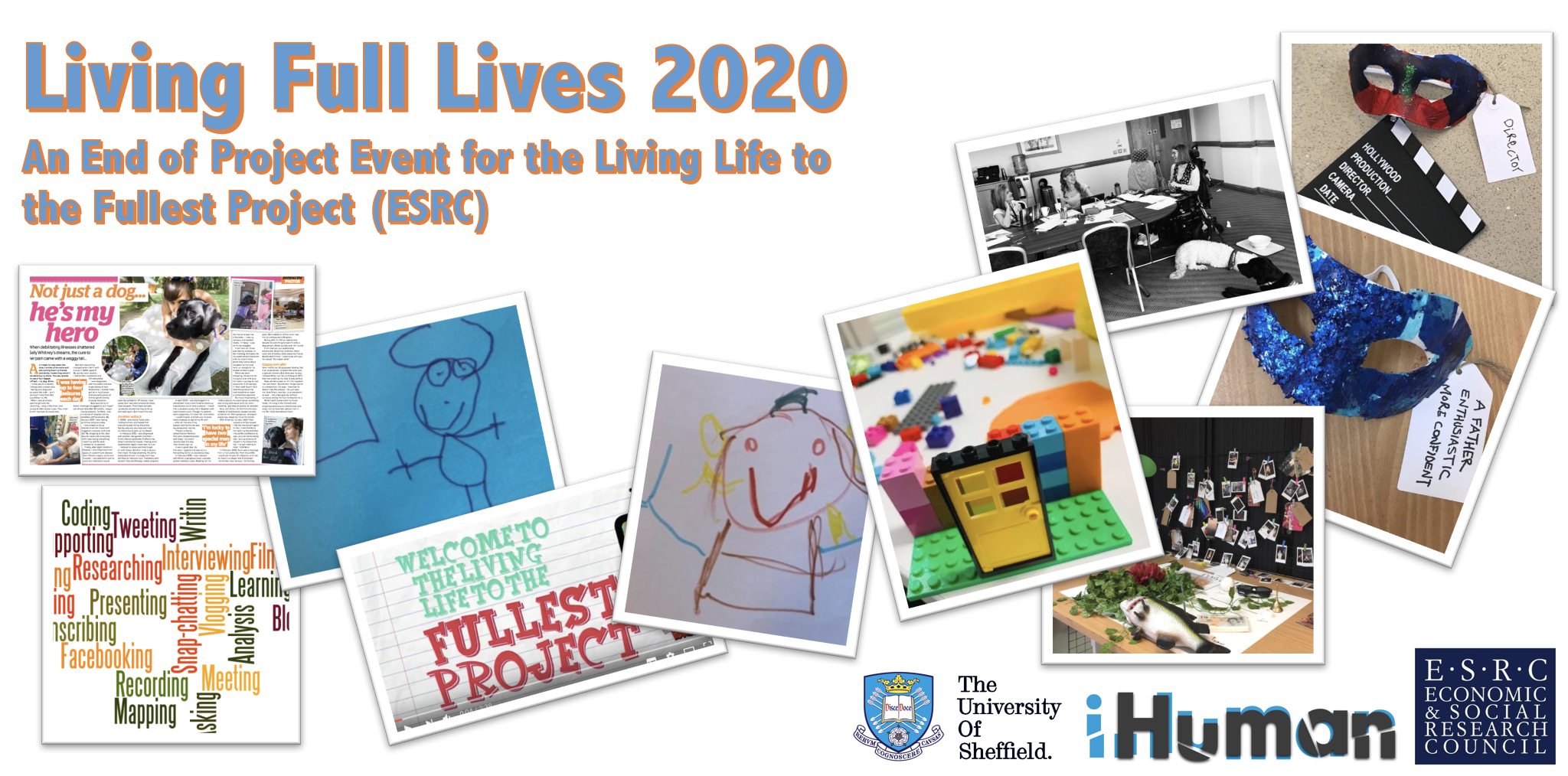 Seventy-four UK universities will be hit with 14 days of strike action in February and March 2020.
Seventy-four UK universities will be hit with 14 days of strike action in February and March 2020.
The disputes centre on the sustainability of the Universities Superannuation Scheme (USS) and rising costs for members, and on universities’ failure to make significant improvements on pay, equality, casualisation and workloads.
The action will start on Thursday 20 February and escalate each week, culminating with a week-long walkout from Monday 9 to Friday 13 March.
As a Research Team at a University that has voted to participate in the strikes, we have decided to go ahead with our end of project event, Living Full Lives 2020, despite it now taking place on a strike day of action.
We have made this difficult decision out of acknowledgement that many of our disabled participants, their parents and families, and our disabled young co-researchers – all of who work outside of the Academy – have already booked travel, accommodation and care/PA support in order to attend the event.
We stand by our university colleagues, and will observe the digital picket on Friday 21st February, out of respect for those taking strike action. A digital picket line is an online and electronic boycott of institutions whose workers are on strike; you can read more about this here.
If you have any questions, please email k.liddiard@sheffield.ac.uk
Disabled young people & employment
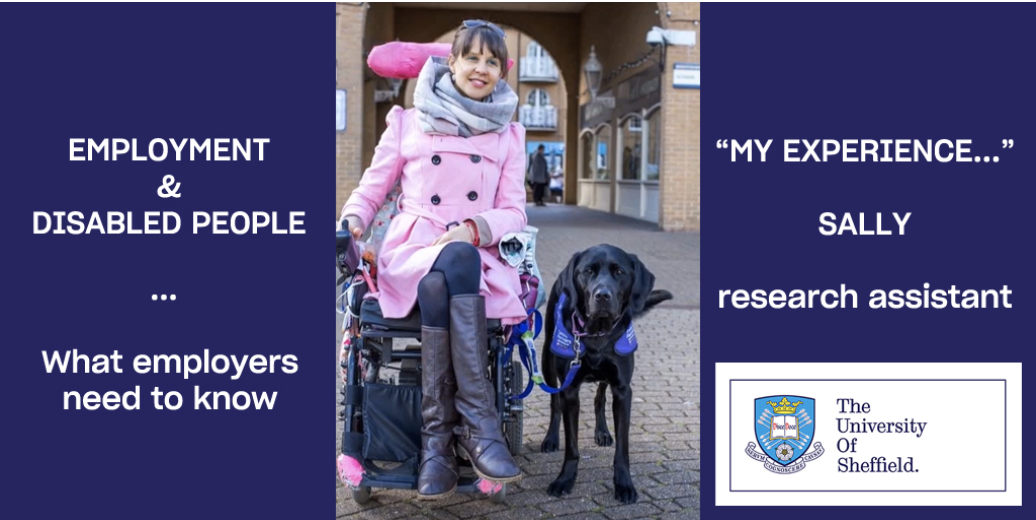 The University of Sheffield and the My Life My Choice Project share their insights with Youth Employment UK on how employers can better support young disabled people.
The University of Sheffield and the My Life My Choice Project share their insights with Youth Employment UK on how employers can better support young disabled people.
Recently, two of our Living Life to the Fullest Co-researchers Lucy Watts MBE and Sally Whitney have been undertaking some work with Youth Employment UK, an independent, not for profit social enterprise founded in 2012 to tackle youth unemployment. Disabled young people are far more likely to be unemployed and under-employed than non-disabled young people, and Youth Employment UK’s aim has been to explore this ‘disability employment gap’ alongside disabled young people.
Key Findings
- Why is there a disability employment gap?
- What does the law provide for?
- What is the business case for employing disabled people?
In the YEUK webinar, three young people also share their experiences on the challenges of transitioning from education into employment. They explore what barriers they experienced, how they felt about their futures and what changed things for them in finding youth friendly employers and being able to see themselves as young professionals.
Thanks to The University of Sheffield, My Life My Choice Project and Sunderland People First along with our three young interviewees, Sally, Paul and Matthew.
One sentence that transformed my life
 We are thrilled to be able to share with you the recent TEDxNHS talk of our Lead Co-Researcher, Lucy Watts MBE. Lucy is a leading advocate, activist and trailblazer in all things related to disability, youth and care. Below we share her groundbreaking talk.
We are thrilled to be able to share with you the recent TEDxNHS talk of our Lead Co-Researcher, Lucy Watts MBE. Lucy is a leading advocate, activist and trailblazer in all things related to disability, youth and care. Below we share her groundbreaking talk.
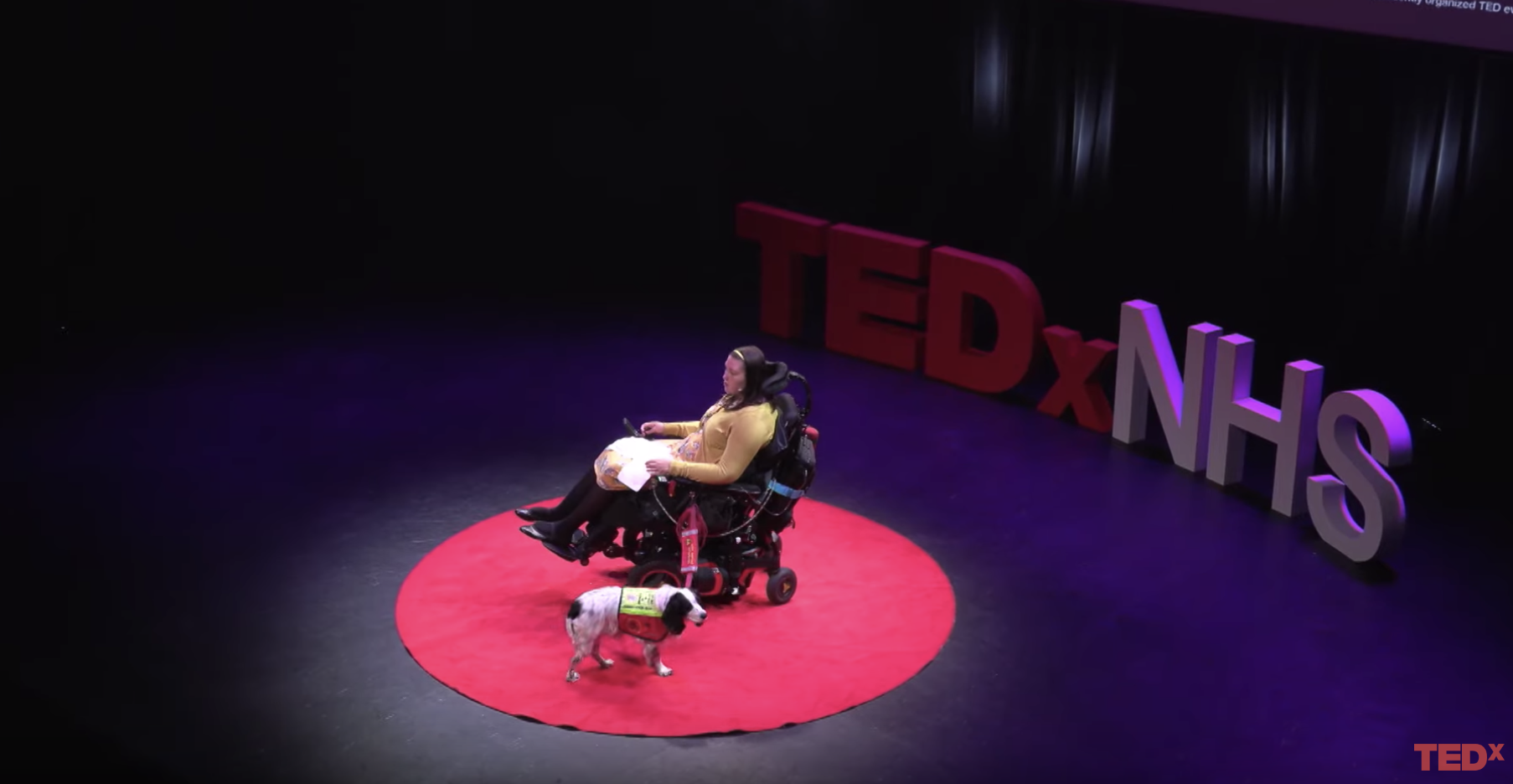
Living Full Lives 2020! An Invite…
We would like to take this opportunity to invite you to Living Full Lives 2020 – an end of project event from the Living Life to the Fullest project!
The event is taking place on 21st February 2020 from 10.00-4.00pm at the Millennium Gallery, Sheffield.
To get your free ticket/s, please register on Eventbrite here
The Living Life to the Fullest project is a research project which seeks to forge new understandings of the lives, hopes, desires and contributions of children and young people with ‘life-limiting’ or ‘life-threatening’ impairments (hereby LL/LTIs). Over the last three years, alongside disabled young people as our co-researchers in the Co-Researcher Collective, the project has been a space where disabled children and young people have told new stories of disability; their own stories.
We are busy working out a schedule for the day, and will update you with details in due course. The event will run from 10.00am – 4.00pm and lunch and refreshments will be provided and there will be regular breaks throughout the day.
Excitingly, on the same day we will be launching the Living Life to the Fullest Art Exhibition (title TBC), which is taking place just next door at the Winter Gardens, Sheffield. The exhibition will showcase all of the artwork produced by disabled children and young people across the project, as well as other creative endeavours that have emerged.
Access information:
Wheelchair accessible venue (Millennium Gallery and Winter Gardens). The Millennium Gallery is fully wheelchair accessible from the Winter Garden or Cadman Lane entrances, and from the Arundel Gate entrance, using the elevator to reach the upper floor.
BSL Interpretation
Accessible toilets The accessible toilet in the Millennium Gallery is via RADAR key entry – we will have one available on the day for communal use. The accessible toilet is gender neutral. The are also non-accessible gender specific toilets available. Anyone can access the communal RADAR key.
In addition, there are two Changing Places toilets nearby; one at The Crucible Theatre and one at the Town Hall. See here for more details.
Parking Due to its city centre location, there is no dedicated car parking at the Millennium Gallery. The closest is the NCP car park at the Crucible Theatre. Limited disabled parking spaces are available for blue badge holders in Surrey Street, approximately 25 metres from the Cadman Lane entrance to the Gallery.
Visual Story A Visual Story will be available prior to the event, sharing clear information about getting to the venue and what to expect from the event. Please email Kirsty (see contact below) if you would like a copy.
For more information on accessibility, please see here and email Kirsty (k.liddiard@sheffield.ac.uk) with any access requests not included above.
The Canine Care Project – An Update
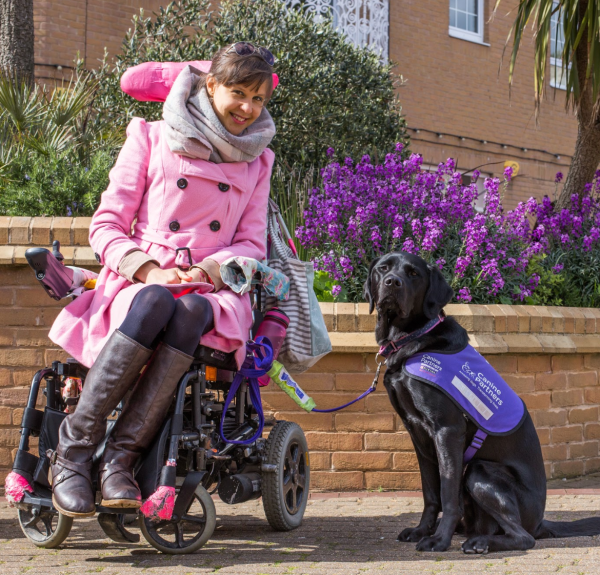
Sally and her Canine Partner, Ethan
Some time ago we told you about an impact – or ‘offshoot’ – project that has emerged out of the Living Life to the Fullest project, largely down to our co-researchers wanting to further explore an area of their life and care that is important to them. Co-researcher Sally Whitney, along with Katy Evans, and our charity partner Canine Partners, have been leading this work – The Canine Care Project – and wanted to share an update.
The Canine Care Project is a research project that explores the experiences of disabled young people who have assistance dogs. An Assistance dog is the internationally established term for a dog that provides assistance to a disabled person, and is task trained to help support them in their lives.
Early findings from the Living Life to the Fullest Project showed that assistance dogs can play a significant part in the lives of disabled young people and can transform their experiences of living with disability. For example, young people told us that an assistance dog did far more for them than practical tasks (although these are very important), but actually made them feel happier, safer and more at ease in social situations.
The Canine Care Project began with a desire to explore these findings further. In partnership with Canine Partners, we administered an online questionnaire to disabled young people (aged 18-35) who are partnered with an assistance dog.
Our research has shown that assistance dogs provide many psychological and social benefits such as increased independence, confidence, motivation and self-esteem. For example, the majority of disabled young people said that their expectations were exceeded (84.2%) by their assistance dog. Disabled young people readily reported to us that their assistance dog has made them feel more optimistic (86.2%) and that they have taken greater joy in everyday activities (91.4%).
“Around the university campus I had gone from being the girl in the wheelchair to being the girl with the amazing dog and that was a very liberating feeling.” – Living Life to the Fullest Participant
Assistance dogs were also said to boost confidence (89.7%) and help disabled young people in various areas of motivation such as setting new goals (87.9%), giving a sense of purpose (86.2%) and trying new things (84.5%).
“Making sure she’s ok [assistance dog] is a reason for me to make sure I am ok – I look after myself better so that I can look after her as she deserves. People treat me differently too, they ask about the dog rather than asking why I’m in a wheelchair.” – Living Life to the Fullest Participant
We are now busy writing an accessible report of these findings, and making an animated short film, to share our findings with disabled young people and their families, education, social care and health professionals, charities and policy makers. Our aim in doing this is to emphasise the incredible benefits disabled young people have said that canine care can offer to them.
Sally said, “Working on this project has been both challenging and hugely rewarding. I’ve had to get to grips with statistics and a quantitative way of working as well as coordinating with others, all with different specialisms and goals. Yet it’s all been focussed on a topic that I’m hugely passionately about!
As ever, we will share our report and animated film here on our project blog when they are ready.
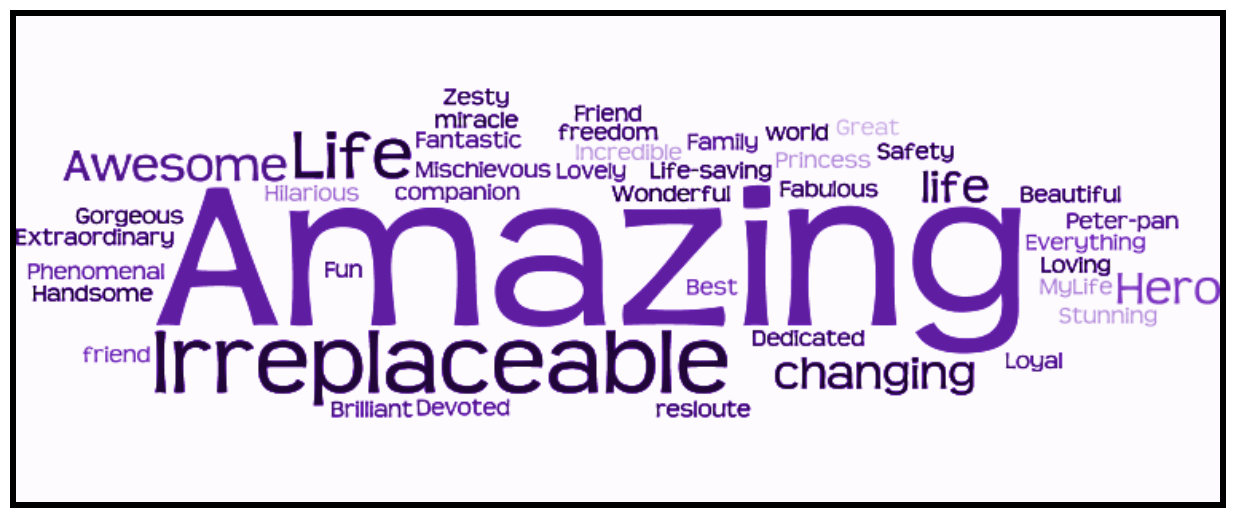
At the end of the online questionnaire, respondents were asked to give one word that they feel describes their dog. A word map of the responses is given above. In this word map, the size of the word corresponds to its popularity. So, as the word map shows, the words “amazing” and “irreplaceable” were most commonly used by disabled young people.
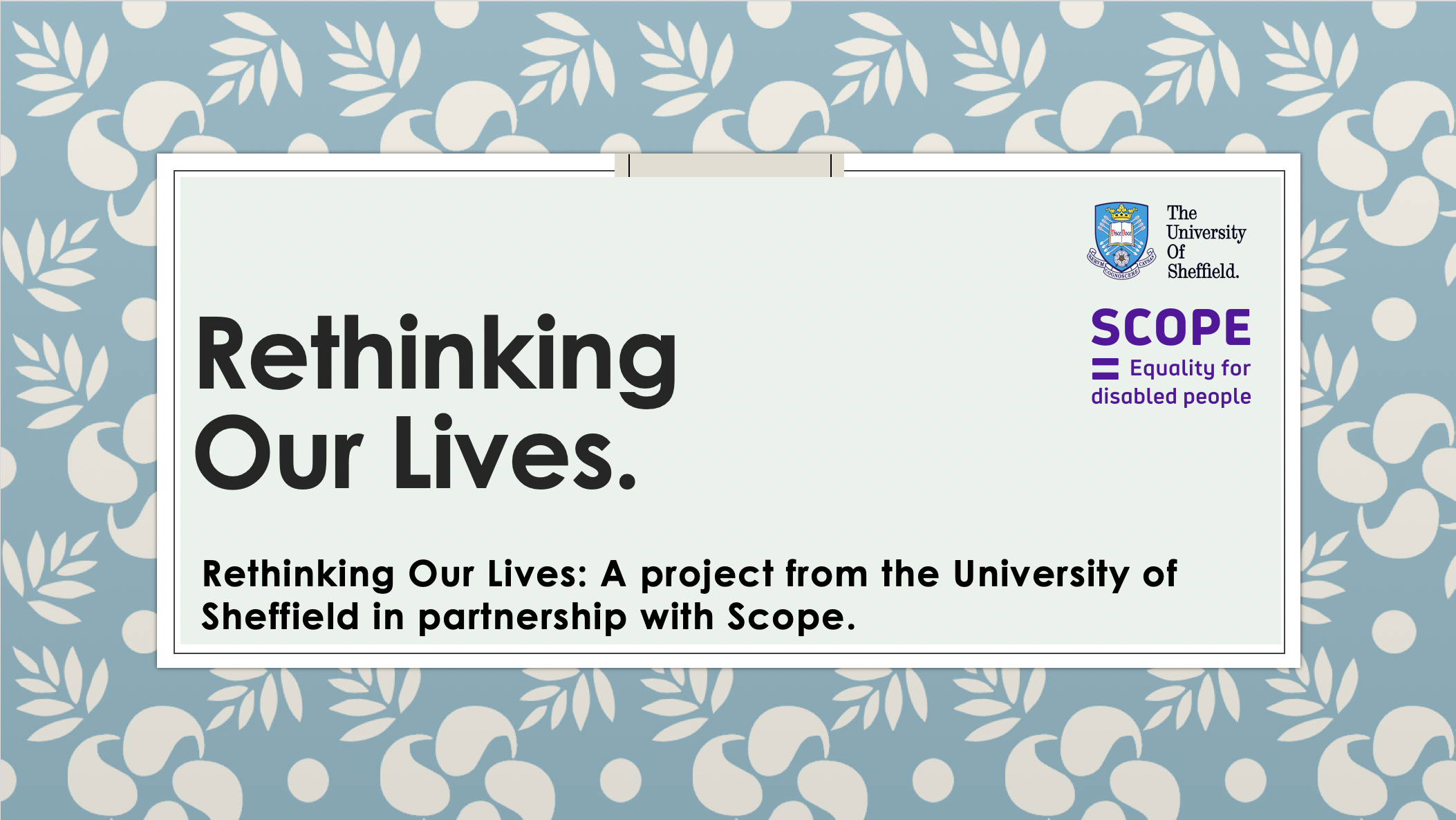







You must be logged in to post a comment.